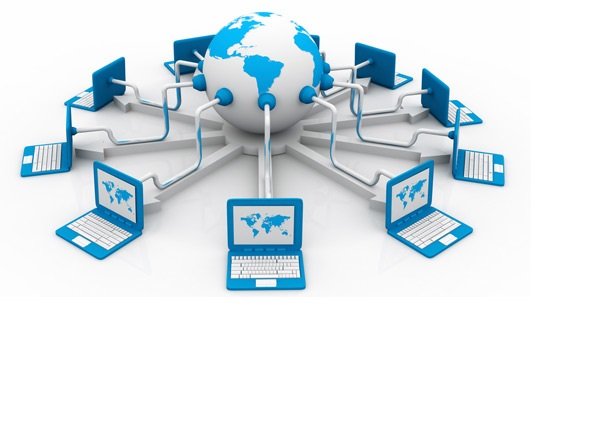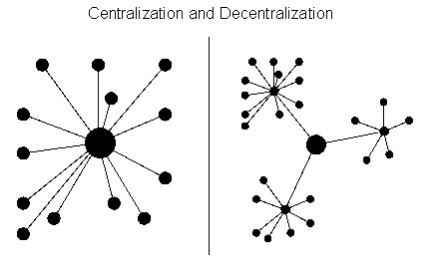If anyone is an avid watcher of HBO’s Silicon Valley, like I am, they might have seen the recent season where the main character Richard is trying to create a fully decentralized internet, free from government interference or the ability or corporate over reach, and I think this is a direction that we will be moving towards in the next 20 years.

Sadly the average first world person doesn’t seem to care about security or government overreaching into their data, but I do believe that as more and more time passes, that will change. It seems like the newer generation doesn’t trust the government, in fact many of the newer generation are questioning the effectiveness of government in ways we haven’t seen before. Even if we look at the election of Donald Trump, whether or not you voted for him, a big reason he won is people are tired of the status quo.
In many third world countries, they are already at the point of zero trust in traditional government and institutions, so ideas like cryptocurrency and decentralization make complete sense. If we talk about Steemit in particular, Im still hoping for some sort of Steemit desktop app that can be set by language and people in countries where it is illegal to speak out against their government, can talk openly and freely. Even if Steemit doesn’t do this, another project probably eventually will.

So back to the idea of a decentralized internet and the benefits it could provide. With the ability for most people to run nodes on a bunch of different electronic devices such as phones, ipads, even TV’s ect, you could create a massive network like the TOR network, but faster and feasible for people who want to do regular tasks.
Right now the biggest problem is that we have to get our internet through providers who have vastly overstepped their boundaries in the last few years, with legislation to keep slower speeds and the ability to sell our data. This disgusting breach of privacy is because there is an oligopoly on internet provision in the first world, especially in the US. If regular users were able to cut off the providers by using a type of internet of things network, we could essentially destroy their power. When companies get too comfortable and have no competition, the consumers end up worse off, which is what we are seeing now.

The idea has been played with before in bitcoin, specifically with 21.co, but I don’t think the world is ready yet to move forward. If there was a way to incentivize people to run nodes with crypto and also provide space for websites through other services like Storj, we could possibly hit the internet 2.0. Im not sure if a single cryptocurrency project could tackle it alone, but perhaps a culmination of multiple ones would be able to solve this problem.
Good post. We're currently on the path to building something like this and integrating Storj, Ethereum and another technology + the incetivization model used by onG.social. That way you can control, consume, distribute any content from a single , decentralized application to all other social platforms without relying wholly on any single one. If a channel ever gets nuked, all content is mirrored through our app. This includes all existing platforms and we'll add more as we go. Issuing our ICO in about 1 month. Here's to a free, unobstructed internet and free flow of information! Cheers
Downvoting a post can decrease pending rewards and make it less visible. Common reasons:
Submit
This is a great article about being futuristic. The future is inevitable and nothing is impossible if the mind gets to work. I am from a developing country of called Papua New Guinea. There are about close to 8 million people, internet penetration at the moment is only 3%, there are 3 telcos and a handful (about 12 ISPs). In the last 2 years internet usage has surprisingly seen a huge growth due to modernization work done by telcos to offer 3G and 4G. Demand will spur growth exponentially, hence development to empower the end users to socialize and interact without any control probably will be the trend.
Downvoting a post can decrease pending rewards and make it less visible. Common reasons:
Submit
Exactly my thoughts. At one point or another the idea will have to brake through. When you start seeing something like this emerging from popular tv shows, this is when you know that the winds are changing. Sooner or later is bound to happen.
Downvoting a post can decrease pending rewards and make it less visible. Common reasons:
Submit
What a powerful platform this would offer the world... Excellent short and sweet post!
Thanks for sharing all this information with us all, it is appreciated from this end. Namaste :)
Downvoting a post can decrease pending rewards and make it less visible. Common reasons:
Submit
Huge opportunity to get in on the ICO of something like this. If you can pick the coin/coins that are gunna be imperative for this type of network and invest you could earn millions! Soooo many people are still in the dark about blockchain, just wait until that total market cap hits 100billion, 500billion, and then a trillion USD. Its inevitable.
Downvoting a post can decrease pending rewards and make it less visible. Common reasons:
Submit
"a big reason he won is people are tired of the status quo"
truth be told my friend..almost as if we have nothing more to lose, so, what the hell, why not..
Downvoting a post can decrease pending rewards and make it less visible. Common reasons:
Submit
I agree with your concern here and hope something like this can evolve. Although, I am not sure it will solve the problem you cite. It isn't the internet providers that have damaged trust, it is the website destinations. For example, it is Facebook, Google, Apple, etc that have been the ones giving info up to the government.
Downvoting a post can decrease pending rewards and make it less visible. Common reasons:
Submit
BTW, I am glad you mentioned Storj. They are one of the coins I invested in and also participating as a storage node - for which you can be paid coins. I have only just started so have not yet received any coins but am excited about their project.
Downvoting a post can decrease pending rewards and make it less visible. Common reasons:
Submit
The more that governments make something suck people always find a way to overcome it. I can see blockchain technology staying one step ahead of them. I would love to see a free silver market using smart contracts to log real prices on the blockchain. Let the sheep pay whatever for manipulated paper and set the real stuff free.
Downvoting a post can decrease pending rewards and make it less visible. Common reasons:
Submit
People in power(Government, Banks, Large Organization or basically any entity with power) will eventually hijack any good idea for their own benefit until someone come up with another disruptive idea. Within a few years, the cycle continues.
Downvoting a post can decrease pending rewards and make it less visible. Common reasons:
Submit
Great article! There have been cases of government overreach which prompted individuals to take their ability to communicate freely into their own hands forming impromptu distributed networks. Those developed out of extreme censorship and revolution. Hopefully we can find peaceful means to break up this oligopoly. If for any reason it should be recognized that distributed systems are safer and less susceptible to disruption. That goes for internet, power grids, banking - many currently essential systems. We need forward looking leadership and soon!
Downvoting a post can decrease pending rewards and make it less visible. Common reasons:
Submit
Good post. Thank you!
Downvoting a post can decrease pending rewards and make it less visible. Common reasons:
Submit
This will come in time, that is what the Golem project is all about.
Downvoting a post can decrease pending rewards and make it less visible. Common reasons:
Submit
Just an observation here... the "Decentralization" graph you show in the article is just another form of centralization: nothing is able to traverse all the way across the graph without going through the central node.
The internet is actually designed to support fairly robust decentralization (though there is an issue with the size of core routing tables). The problem is the incredible cost of making the required meatspace connections. Wireless mesh networking has limited potential here, because there's only so much bandwidth available before interference sets in. Hardwire connections allow for far greater bandwidth, but of course cost huge amounts of money to go any real distance.
The interesting possibility that cryptocurrencies provide is realistically paying for actual network utilization, based on the route your packets actually took and the latency involved. That might make it practical for innovative solutions for longer-distance transport. But for "last mile" connections you'd need a LOT of people using devices that self-organized into a mesh. That's going to be challenging to create.
Downvoting a post can decrease pending rewards and make it less visible. Common reasons:
Submit
Such a network already exists: https://geti2p.net/en/
Downvoting a post can decrease pending rewards and make it less visible. Common reasons:
Submit